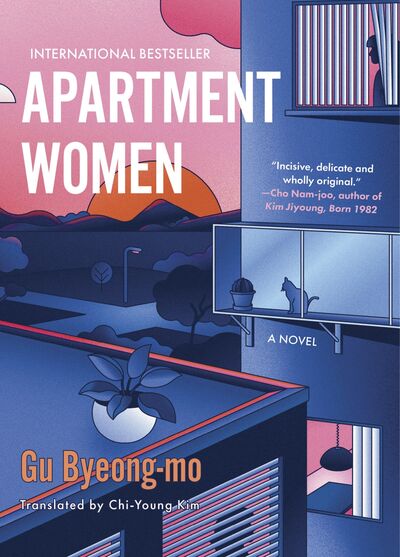Babies Forever
Apartment Women
By Gu Byeong-Mo

19 Mar, 2025
Gu Byeong-Mo’s 2018 Apartment Women is a stand-alone mainstream novel. The 2024 English translation is by Chi-Young Kim.
Is Apartment Women also a dystopia? More on that later.
For Seo Yojin, husband Joen Euno, and six-year-old Jeon Siyul, the Dream Future Pilot Communal Apartments is a solution to pressing housing issues. Getting in wasn’t easy, but Yojin and her family were among the lucky few to be selected.
One small catch: The Dream Future Pilot Communal Apartments is a bold attempt to address South Korea’s negligible birthrate. In exchange for new homes in an invigorating rural setting, certain conditions need to be met.
Most importantly, each family is expected to have three children (pregnancies included) within ten years of residence. Failing to meet this requirement due to medical factors would not be punished — indeed, IVF is subsidized — but willful reproductive negligence will leave tenants on the hook for a substantial bill.
The Dream Future Pilot Communal Apartments value the communal aspect. Tenants are encouraged to socialize with each other. The thin walls are not soundproof. This facilitates the ancient human hobby of spying on and judging neighbors for their manifest failings.
Near-rural life has drawbacks that the former city-dwellers did not foresee. The olfactory environment is more complex1, and often unpleasant. Yojin faces a long commute to work now, with little in the way of public transportation infrastructure between her and her job.
Solution: carpool with neighbor Sin Jaegang. Jaegang does not mind carpooling with Yojin. In fact, he quite likes it. Jaegang begins an incessant campaign to endear himself to her. The fact that Yojin in no way reciprocates his advances does not deter Jaegang. Surely, the solution is to try harder!
In almost every way, life in the Dream Future Pilot Communal Apartments fails to meet Yojin’s minimal expectations. But what alternatives are there?
~oOo~
March seems to be James’ Expectations About Books Are Wildly Wrong month. I read far too much into the part of the book blurb that read “the experimental community is a government initiative designed to boost the national birth rate.” Experimental is futuristic, right? Except not in this case, because this is a purely mundane novel about a contemporary effort to boost birthrates.
The initiative does not go entirely well. In fact, “abject failure” might not be strong enough. It is easy to see why. Aside from rent control and the medical support (which we never see in action and may not live up to the brochure hype), there’s no real effort to reduce the difficulty and cost of producing and rearing kids. The assumption appears to be that all that’s needed is to give married couples housing and a contractual obligation to reproduce and the rest will follow naturally.
(This ain’t ideal, but at least it is better than the American approach of trying to shore up birthrates by maximizing childbirth-related deaths. Useless is better than actively malevolent.)
The husbands range between useless and actively counter-productive. The work to maintain households and raise kids falls on feminine shoulders. Yojin has to deal with all of this, all while fending off unwanted advances. Looking at this from the outside, it seems obvious that at least some women will reach a point where they just walk away from the whole wife-and-mother shtick. To the characters in the novel, this result comes as an amazing revelation.
Reading this book reminded me of a venerable American book published back before the intractable limits of American society became as clear as they are now. I speak of course of Marilyn French’s The Women’s Room, whose take on American men was just as feminist as Gu Byeong-Mo’s views on Korean men.

That comparison might not be useful to readers unfamiliar with half-century-old second wave feminist novels. Would it help if I compared The Apartment Women to the first episode of North of North?
The Apartment Women isn’t a dystopia in the classic sense of an imaginary society in which certain deplorable tendencies of modern society are exaggerated for rhetorical effect. It’s a dystopia in the sense of a contemporary society whose flaws are sufficient to serve for rhetorical effect, no exaggeration needed.
Apartment Women is available here (Hanover Square Press), here (Barnes & Noble), here (Bookshop US), here (Bookshop UK), here (Chapters-Indigo), and here (Words Worth Books).
1: Ah, memories of a family that moved to Wellesley in rural Ontario and tried to sue the neighboring farms for smelling like farms. Note that the farms were there first.
